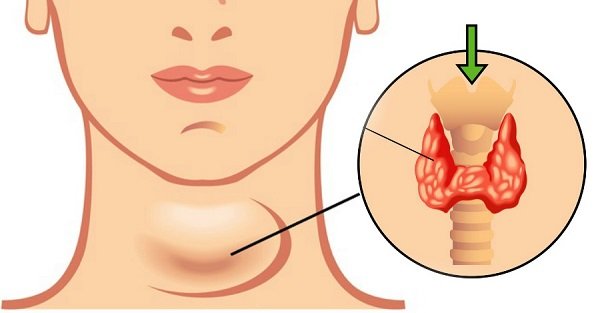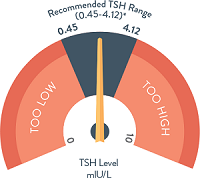Hypothyroidism is a fairly common illness that can be seen particularly in women and especially as we get older. The problem is that the thyroid is under-active, meaning it doesn't make enough of thyroid hormone, the hormone that is important for keeping our basal metabolic rate burning calories where it should.
When our levels of thyroid hormones are too low, the symptoms are:
- Fatigue and sluggishness
- Sensitivity to cold
- Dry skin
- Increase in Cholesterol levels
- Increase in weight
- Pains and weakness in muscles
- Depression and a lot of people becomes depressed.
It's a physiological thing that's related to the level of t3 and t4 which are the hormones that are made by the thyroid gland under the supervision of the hypothalamus which is in the brain and the pituitary gland which is at the base of the brain. There's a interesting relationship between the thyroid stimulating hormone better known as TSH which is made by the pituitary gland and by the thyroid gland itself which makes the hormones t3 and t4.
When the levels of t3 and t4 are too low, that signals to the to the hypothalamus and the pituitary gland by regulate its production of TSH because when levels are low, TSH which is thyroid stimulating hormone will go back down to the thyroid and tell it to make more t3 and t4 so it's an interesting biochemical endocrine feedback system.
SYMPTOMS
When we have hypothyroidism, the kinds of symptoms we see are goiter which means a large thyroid and in some areas where there's iodine deficiency, this was a common problem until we iodized our salt. You could see people who had huge thyroid glands and that was an attempt of the thyroid to try and become bigger to make more thyroid hormone but in the absence of iodine which is needed to make t3 and t4, it wasn't going to happen that's why you see goiter.
Other things that may be seen as part of hypothyroidism are a high LDL cholesterol, depressions I mentioned earlier, low thinking, a lot of people have peripheral neuropathies and in advanced cases as a condition called mix edema which is really a medical emergency and the thyroid hormone levels are so low that if you don't treat it just right with small amounts of thyroid hormone, you can get into lots of problems with adrenal stress and insufficiency.
Some people who have hypothyroidism have problems with infertility and then of course with birth defects.
HYPOTHYROIDISM TEST
The thyroid test, the free t3, t4 which is a the actual levels of those hormones and the TSH sometimes don't accurately reflect hypo or hyperthyroidism. In those cases a thyroid hormone is administered to patients to see what happens. Scientifically, there's a test called a bio energy test that is actually quite accurate in measuring the basal metabolic rate.
The basal metabolic rate is something that was measured probably a hundred years ago during the process of trying to find a way to diagnose people a hypothyroid.
In the morning, people who are fasted in a resting position or their oxygen consumption were measured and Co2 production and based on that, how fast they're making calories and burning energy can be known.
If the level is too low, patients known to be hypothyroid and if the levels too High, they’re known to be hyperthyroid or overactive thyroid. This test is the gold standard and in cases where the doctors are not sure what they’re dealing with, they perform a bio energy test that measures the basal metabolic rate.
CONCLUSION
Hypothyroidism is a fairly common condition, it can be measured in clinical practice by doing a blood test and if you have the symptoms that are consistent with it, you may want to see your doctor.
Thanks for reading. Follow me @creativity101 for more.





Creepy!!! I feel something climbing our my throat
lol
Very useful text. It's a relatively common disease and we need to know more about it, especially the population that is most often compromised.
Thanks for dropping by